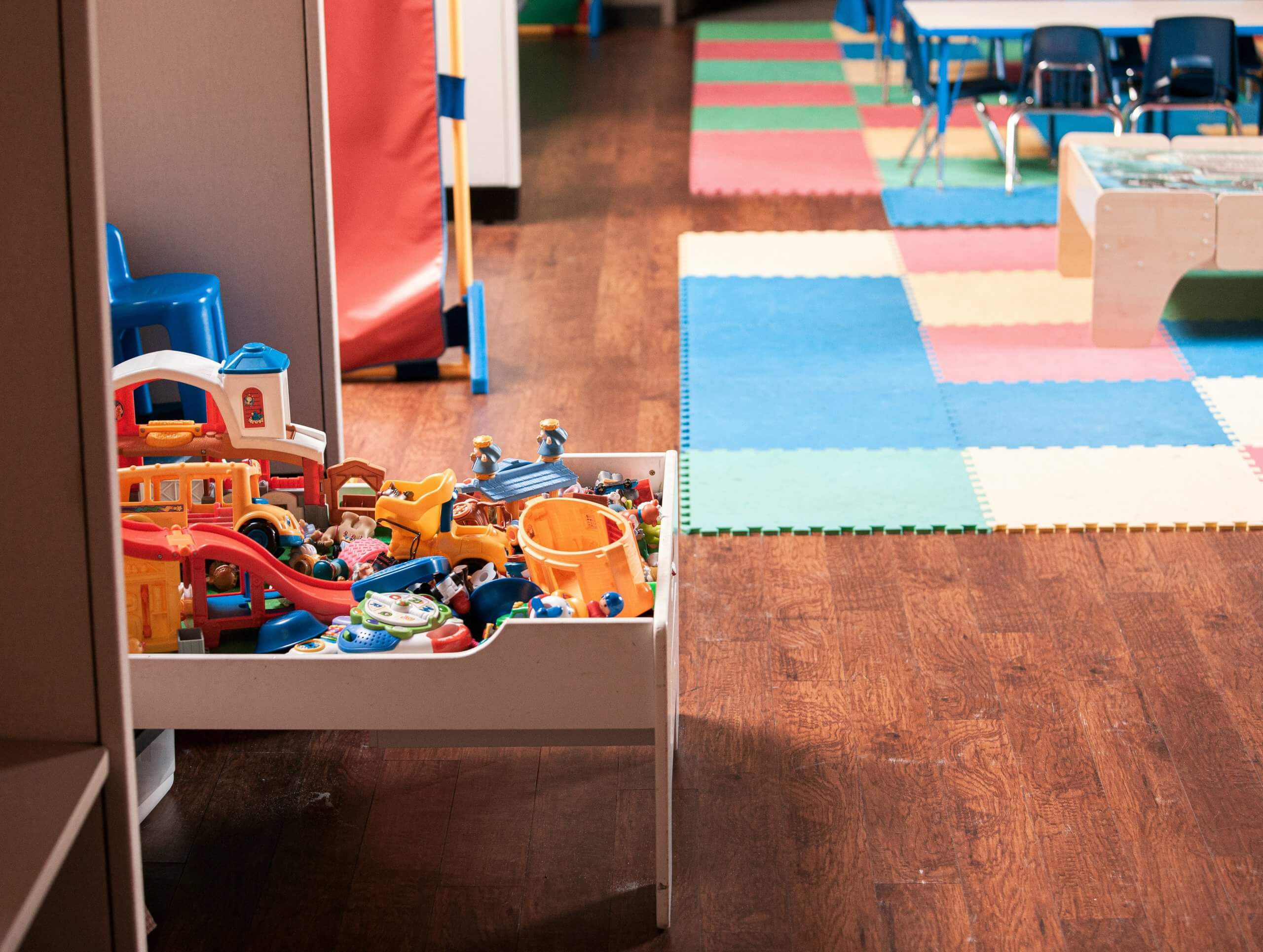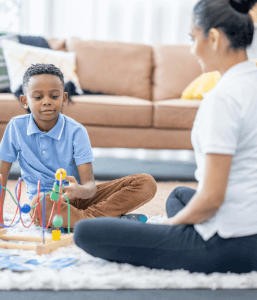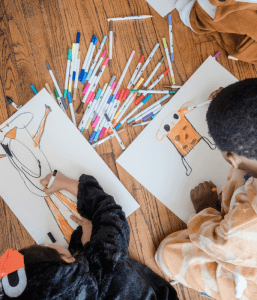The therapeutic benefits of play are numerous. You can find these discussed in Part 1 of The Vital Role of Play in Easing Anxiety in Children. In fact, play is very frequently integrated by our clinicians who provide child anxiety treatment at home and in our Scotch Plains, NJ and Branchburg, NJ offices.
There are countless ways parents can include play in their child’s routine to reduce anxiety. Considering the type of anxiety your child is experiencing can help decide how to add or respond to play. Some children naturally experience a high level of anxiety. Anxiety may run in the family. Moreover, they may have had some early childhood events that raised their baseline anxiety level. Or their neurobiology is just built that way. Even so, intentional ongoing play can bolster confidence and increase feelings of control and mastery.
As a provider of child therapy for anxiety in Scotch Plains, NJ, we frequently work with children after they experience stressful experiences and changes. For example, divorce or starting at a new school. Intentional play may help to manage or express feelings that help them better adjust. Additionally, a future situation can raise levels of anticipatory anxiety. Examples of this might include having to give blood or using asthma medication. Indeed, they make dolls with little inhalers and doctor’s kits children can use to become comfortable.
Play can also be in direct reaction to an incident like anaphylaxis or a car accident as shown in Part 1. In fact, repetitive play and art that help your child tell the story of what happened can aid in processing the incident. For instance, reenacting his experience with anaphylaxis allowed my son to experience the benefits of child anxiety treatment at home.
Also remember anxiety is many times about powerlessness and feeling out of control. Indeed, play can be a powerful opportunity to give your child control and help them feel powerful. In Part 1, we see my child establish power over my behavior and control over his ability to find safety for himself.
Ways to Incorporate Play:
1. Create a Play-Friendly Environment
Choose a space in your home where your child can engage in different types of play. In addition, ensure that this space is free from distractions. Also, it must includes a variety of toys, games, and art supplies. This allows your child to choose activities based on their mood and interests. They have the power to decide what they want to do.
2. Schedule Unstructured Tech Free Play Time
In our fast-paced lives, it’s easy to overlook the importance of unstructured play. Dedicated time each day for your child to play without any specific goals or expectations. This could be anything from free play with toys to exploring nature in the backyard. It could be 5 minutes or hours. However, consistency is important.
3. Join in the Play
Additionally, take part in your child’s play. This strengthens your bond and provides insights into their thoughts and emotions. The following are a few important strategies used in child anxiety treatment at home. These strategies can be just as effective as those learned in the play therapy room.
There are a few important guidelines that will help to make the most out of the play. I highly recommend the book, “Growing Up Brave, Expert Strategies for Helping Your Child Overcome Fear, Stress and Anxiety” by Donna Pincus. She outlines some incredible do’s and don’ts for your involvement in your child’s play. These tips will empower your child and bolster your relationship with them. Here are some of them:
- Don’t ask questions. This is experienced by most children as leading. In fact, anxious children may shift their play in an attempt to please you. This would negate many of the benefits discussed. Furthermore, many questions are hidden commands or directives. (e.g. “Are you done with the doll? Should we put her pack on the shelf?”)
- Don’t Criticize. Typically, any statement that includes “should” or provides directions to what your child is doing will impact your child’s process. This can also happen when we use the play as a teaching moment. It shifts control of the situation back to the parent. This also impacts the attachment bond you are attempting to foster.
- Don’t give commands. Refrain from telling your child what to do or how to play. Once again the aim is to understand their inner world. We want to give them all the control, if only for a short period of time. Finally, we want to prioritize the warm connection between parent and child.
- Do be completely present. Put your phone in silent mode in another room. Don’t multitask. Don’t get distracted. Attempt to tap into anything you like about your child and lean into that.
- Do praise your child. Be specific and loving about whatever they are doing. “Your hide and seek skills are incredible.” “You’re so creative.”
- Do express enthusiasm. Make it clear that you are excited about this special time together. Use physical touch if your child likes this. Consider your facial expressions and body language. It is better to be fully enthusiastic for a short period of time than visually bored or annoyed for a longer period of time.
- Do describe what is happening. Observe their play making warm affirming observations. “You’re combing dolly’s hair.” “You caught the ball.” Describing your child’s play can help your child feel understood. This also helps encourage reflective thinking
.
- Do imitate your child’s behaviors. Lean into the idea that imitation is the highest form of flattery. You can independently imitate their play and they might invite you to actively join. This can include making your own Lego creation, or moving action figures they aren’t currently playing with in a similar fashion.
- Do reflect what your child is saying. You want them to feel heard.
In summary, follow their lead and remember the goal is to create a supportive and non-judgmental environment.
 4. Integrate Play into Learning
4. Integrate Play into Learning
Furthermore, use play as a tool for learning and skill development. Educational games, puzzles, and activities make learning enjoyable and contribute to cognitive development. These games can be a great way to rehearse skills developed through child anxiety treatment at home. In addition, this approach helps children associate positive emotions with learning. Thus, it reduces anxiety related to academic challenges.
5. Encourage Social Play
Create opportunities for your child to engage in social play. For example, it could be playdates, group activities, or team sports. Social play helps children develop important social skills, build friendships, and gain a sense of belonging. Altogether, social play contributes to emotional well-being.
Conclusion
Are you concerned about your child’s anxiety and emotional well-being? Consider the transformative power of play in child therapy for anxiety in Branchburg, NJ and Scotch Plains, NJ. Through the language of play, children can express their thoughts and feelings. Indeed, play therapy is an opportunity for your child to explore and process their emotions. It also helps to develop coping skills and build resilience. As a parent, this step can make a big difference in your child’s ability to manage anxiety and thrive. To begin, reach out to a play therapist today and give your child the gift of healing and growth. Practice the above strategies to supplement child anxiety treatment at home. Above all, investing in their mental health now can set the foundation for a brighter and more fulfilling future.
Get Started With Child Therapy in New Jersey Today!
Play can be an important coping skill for a child with anxiety. Indeed, a child therapist can provide practical tips to help you understand the importance of play for a child with anxiety. Our child therapists in Branchburg, NJ, and Scotch Plains, NJ understand the importance of parent involvement. To ensure that you have the parenting support you need and deserve, and to begin therapy for your child, follow these steps:
- Connect with Brave Minds Psychological Services today for a free 20-minute consultation.
- Get your questions answered by one of our experienced therapists.
- Begin feeling more hopeful as a parent.
Other Counseling Services at Brave Minds Psychological Services
At Brave Minds Psychological Services, we offer a variety of services from our licensed therapists in order to get you on the right path to healing. Our other services include child sexual abuse therapy and food allergy therapy. For teens, we provide anxiety treatment for teens, and teen social phobia therapy. We also specialize in adult anxiety counseling, postpartum counseling, birth trauma therapy, and sexual assault counseling for adults. Other offerings include online therapy, group therapy, couples counseling, and counseling for parents.
Futhermore, we also have a blog where we write about a wealth of different mental health subjects. If you’re interested in learning more about us here at Brave Minds Psychological Services, please reach out at our Scotch Plains and Branchburg counseling offices!





 4. Integrate Play into Learning
4. Integrate Play into Learning